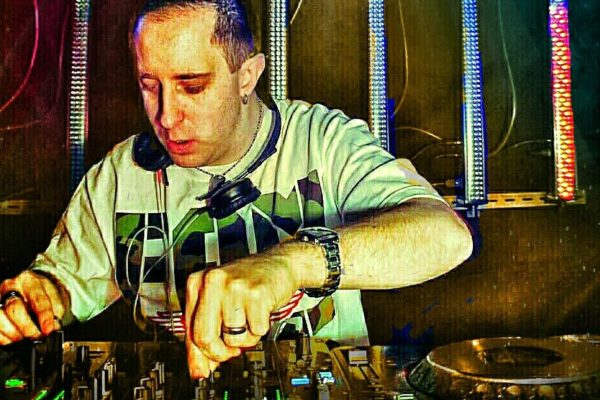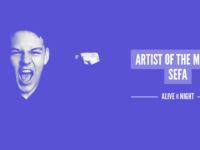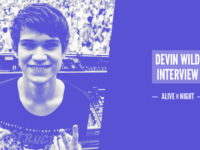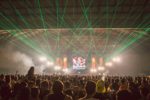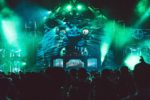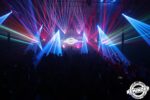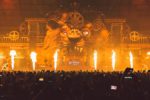Originally producing Freeform under the name Leigh Outrage and DJing at events around the south coast of England, Leigh Garner took on the moniker Eufeion in the mid-2000s and has been creating UK Hardcore magic ever since, appearing regularly at events such as HTID, Uproar and Fusion and running his own label, Ninja Hardcore.
In 2016, Eufeion joined the Core Fever label and turned his attention to producing innovative, up front UK Hardcore, with big tracks including “Up Above”, “Breathless” and “Exhilarate” released last year and tons of exciting new music lined up already for 2017.
Alive At Night caught up with Leigh for a chat about his career and about some of the unique challenges he has faced as an artist due to the fact that he has a hearing impairment.
– For any of our readers who don’t know you yet, can you give us a brief introduction to Eufeion?
I’m a UK Hardcore/Happy Hardcore DJ and producer from the south coast of England, UK. I’ve been a DJ since around 1996 and a producer from around 2001, originally producing Freeform. I’m a self-taught music producer with a love for music in general.
Around the mid-2000’s, I moved to the more uplifting side of UK Hardcore and wanted to separate my new music from my Freeform roots so I adopted the name Eufeion. I developed my new sound as both a DJ and producer and I’ve loved the challenge of creating something in my own style.
My music currently takes inspiration from European Hardstyle & the general EDM scene; I also still have a love for the ‘90s rave music which I grew up on and a lot of my music still takes inspiration from that era. As a DJ I’ve always taken an approach of clean and energetic mixing, keeping a pace going within my sets while staying versatile so as to keep the listener guessing what’s next.
By the way, the name Eufeion doesn’t actually mean anything, it’s just unique!
– Last year was a huge year for the UK Hardcore scene, what were the highlights of the year for you?
A lot happened last year in terms of the music, it was exciting to see artists wanting to work together and push each other; artists like Chris Fear, Clarkey, Jakka B, Jekyll, Hartshorn and many more are all promoting each other’s work and pushing each other towards the next level.
I think the competition with newer artists getting into the scene has been great as it has motivated not only me but others as well to work harder and spend more time on tracks to really polish them up.
For myself last year, playing back out at HTID In The Sun was great as I got to meet a lot of people from other countries and catch up with other UK artists who I would not normally see as they are in different parts of the country. I had a really successful year with my own music, I received a lot of really positive comments about how I had changed my sound to a more modern feel in such a short space of time. Seeing tracks like “Exhilarate” and “Breathless” go up the charts was great.
I also for the first time in my career went in for a remix competition – to remix Special D & Scott Brown’s “Elysium” – and I came out as one of the winners which was fantastic. I’d even started the year on a high note after hearing “Exhilarate” played to a packed arena at HTID Premonition on NYE 2015 (cheers to Clarkey & Jekyll for dropping the track and to MC Whizzkid for the shout out!)
– Most people listening to music you have produced or dancing to your DJ sets would have no idea that you actually have a hearing impairment. You started DJing back in 1996, were you already experiencing hearing problems back then?
My hearing problem was present way before I ever even considered DJing. I used to DJ a lot when I was younger and still in school, but I wasn’t aware of the nature of the problem until after many tests I was told I needed to have grommets put in. After the operation, the first time I turned the decks back on, I hadn’t changed any of the volume settings on the headphones or the speakers and yet I was shocked at how loud the music was. Even weeks later I was so cautious of sound levels being what I was experiencing as loud but in fact they weren’t loud at all, not even the neighbours could hear!
Although grommets are usually a straightforward procedure used to relieve middle ear problems, I ended up with some complications and further infections over the years. I have ear drum perforations in both ears; I’ve got about 30% of an ear drum in one ear and 70% in the other along with some inner ear damage. There are some further medical options available to possibly help, but they do come with a risk of further damage.
As a prime day-to-day example of my hearing, if I go outside I can’t always hear background noises like cars in the distance, footsteps or birds tweeting. For some activities, including watching TV and going to the cinema, I will wear hearing aids however you will never see me with them at raves as mostly people shout anyway and I can hear that. I do a lot of gaming, for which I use a gaming headset with a superhuman hearing option that will amplify certain sounds.
– When DJing, how do you compensate for your loss of hearing? Are there certain notes or frequencies that you can’t hear and how do you make up for this?
When it comes to DJing I use a mixture of both of my ears to hear different sounds. My right ear can hear more of the low end sounds like kick drums, while my left ear hears more of the higher end like high hats and snappy claps. I can still hear all of these in both ears but different sounds are much more prominent in each ear. Over the years I’ve become used to this so I tend to mix in my headphones then just quick reference the track levels on the monitors; this is why you’ll see me using my headphones a lot on both ears when mixing.
With that in mind, most modern UK Hardcore has very prominent punchy kicks and snappy claps, which is perfect for me, but equally because I started out in the 90’s old skool rave music is second nature for me to mix, even breakbeat old skool, because I grew up with those sounds and samples.
As for the headphones I use while playing out (and I know some people will laugh at this) I actually use Beats headphones, granted they are frowned upon but they have so much bottom end. I can have the headphones turned down lower at events but still be able to hear the kicks, claps and percussion clearly for mixing. There are times where I find the DJs on before me have had the headphones extremely loud.
– Of course DJing is just part of your music career – you have also been writing and producing music for many years. How does your hearing affect your work in the studio?
Writing music is the most challenging part and I am my own biggest critic when it comes to being happy with my own engineering and mastering. In the studio I use a lot of referencing and analysers because I have to compensate for my hearing faults via the EQ at both ends of the spectrum. My hearing is slightly off balance due to the holes in my ear drums and my ears having great differences in frequencies.
I’m always looking into new ways to engineer and master, trying to make my sound as clear and full sounding as possible. Some people may say “Why don’t you have someone else mix and master tracks for you”, but to me this would defeat the objective of trying to get better at what I do. I want to overcome my problems and learn how to work around them.
– Have you ever experienced any prejudice in the music scene because of your hearing impairment?
Currently none that I know of. The people who know about my hearing, such as Core Fever label head Chris Fear, have told me time and time again that they are taken aback by the quality and consistency of my music, those kind of comments drive me to do try and do even better, but I will still criticise my own work.
– In addition to hearing loss you also have tinnitus, a constant ringing in the ears. Tinnitus is becoming an increasingly common problem for DJs, event staff and ravers due to damage caused by exposure to loud music. We are starting to see more artists speaking up about this, but still the majority of ravers aren’t wearing earplugs. Do you think there should be more promotion in the scene about the need for hearing protection?
Most definitely, there needs to be much more awareness of the long term effects. One event I went to many years ago, the event was so loud your voice was vibrating when you were shouting anywhere in the venue. Back then smoking areas weren’t a thing, if you left the arena even to go into the foyer you were leaving the venue and wouldn’t be allowed to walk back in. After seven hours my ears were suffering despite wearing ear plugs the whole time.
Artists and ravers need to take into consideration that while it may be amazing to stand next to speakers now, there could be serious long term negative effects.
– Have you met many other people who are working in the music industry despite having hearing problems?
Not so much people with the same type of hearing problems as I’ve got, but I have met a number of people who have tinnitus and even some people who are starting to suffer overall loss of hearing due to exposure to loud music, all the more reason to remember to protect your ears!
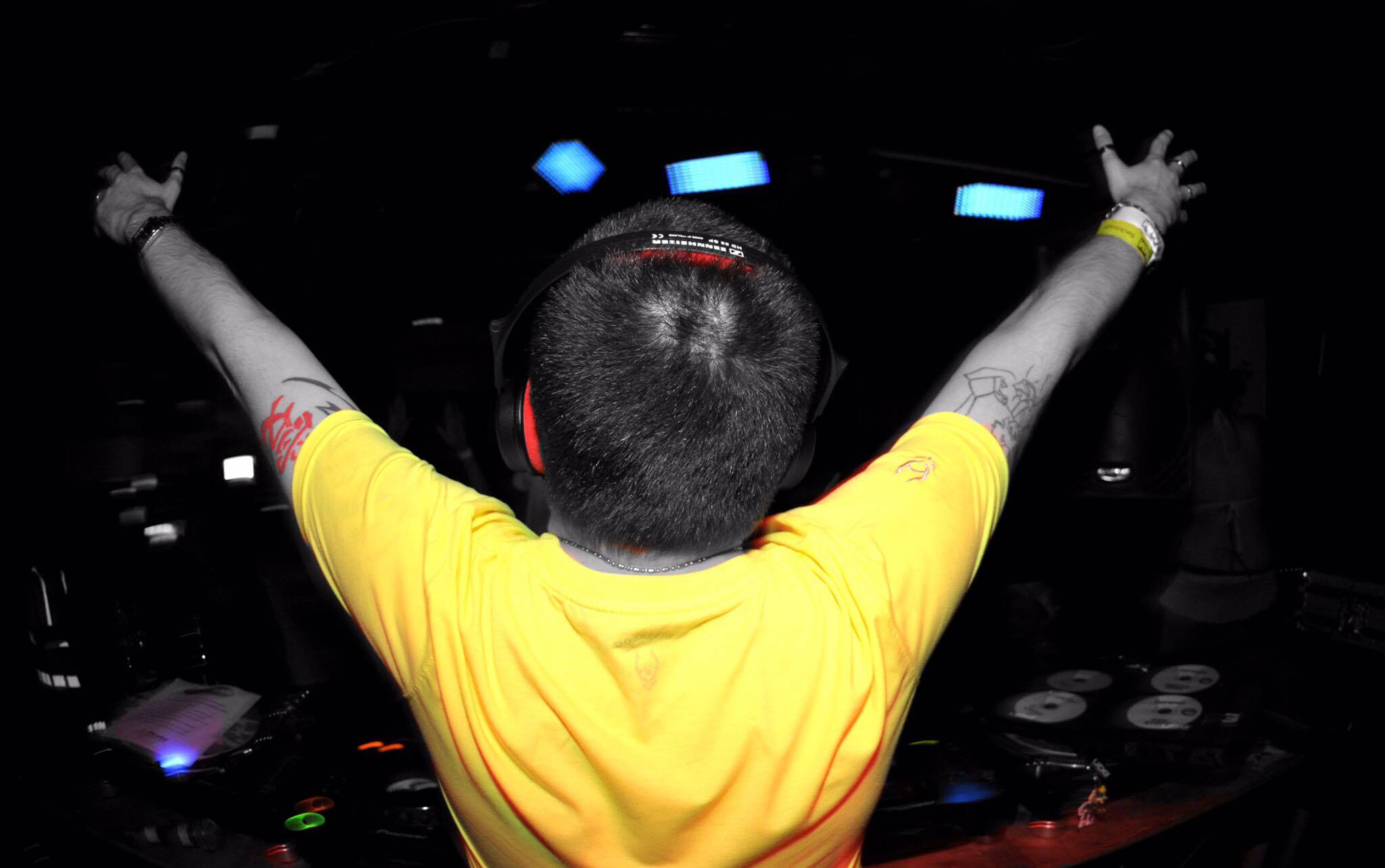
– What advice would you give to anyone reading this who loves music but may feel barred from pursuing a career as an artist due to a hearing impairment?
Don’t let a problem deter you from what you could possibly do. If I had let my problems take control years ago, I wouldn’t have been able to experience some of the amazing opportunities I’ve had both in the studio and performing at events – from playing in other countries like Canada and Japan to having fans of my work telling me how my music has inspired them to continue trying.
If you have the talent then at least give music a try, you never know what you can overcome and work with until you face it and see where it leads you.
– Looking back over your career so far, what have been the most memorable moments for you as an artist?
I have had many memorable moments but some of the most stand out are being nominated for the Hardcore Heaven Awards, DJing in Tokyo, playing B2B with Breeze at Uproar on the main stage and remixing some of the biggest anthems in UK Hardcore such as “Now is The Time”, “Shooting Star” and “Slide Away”. Also having my work played on BBC Radio 1 back when Kutski used to host a hard dance show and having my track “Saw” used on national TV – a dance company used the track for their appearance on “Britain’s Got Talent”!
There have been many amazing moments both big and small, I’m still on this journey so I’m hoping for many more to come.
– And finally, what’s coming up next for you in 2017? Are there any new releases, collaborations or event bookings you can tell us about?
This year is shaping up nicely with a lot of exciting things happening. I have a lot of releases to come out on Core Fever over the course of the year, including some unannounced projects, as well as releases planned for my own label Ninja Hardcore. I’m currently working on a collaboration remix with Hartshorn and I also have tracks planned with Chris Fear, Jakka-B, Blue Eyes, Denile, Zoe Vanwest and several other artists.
Current announced releases are:
– Eufeion – “Frozen (Heart of Ice) (2017 Re-Edit)” – (Hardcore Rapture) – Out Now
– Eufeion & Konekshon – “Sunset City” – (Ninja Hardcore) – 20th March
– Eufeion & Denile – “Better Things” – (Go Hard Digital) – 3rd April
– S3RL Ft. Harri Rush – “Nostalgic (Eufeion Remix)” – (EMFA Music) – June 2017
When I play at events this year I will be promoting not only my own sound but the Core Fever label as well, with my sets featuring artists and music on the label. I may also be heading over to the USA and Canada again this year, so stay tuned for news on that.
In the next couple of months you can catch me at:
– Natural Born Ravers vs Bring Back The Rave – (Core Fever Showcase) – Northampton, UK – 8th April
– Secret Society (FatSteve & Eufeion’s Birthday) – Portsmouth, UK – 12th May
Leigh, thank you so much for sharing your story and experiences with Alive At Night readers. Here’s to 2017 being another very successful year for Eufeion!
FOLLOW EUFEION:




 06 Mar 2017
06 Mar 2017  Posted by Nicki Ranger
Posted by Nicki Ranger
